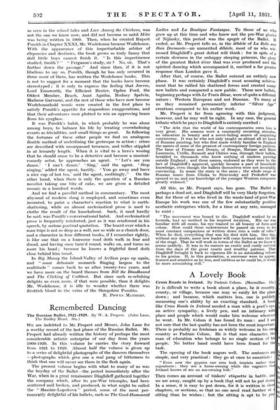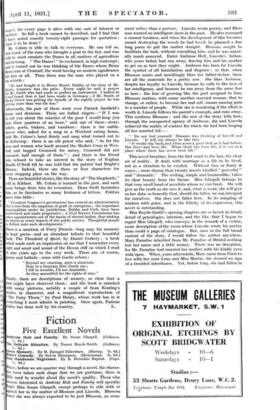A Lovely Book
Cross Roads in Ireland. By Pe.draic Colum. (Macmillan. 15s.) IT is difficult to write a book about a place, be it country, county, or village, because one may so easily let the place down ; and because, which matters less, one is publicly measuring one's ability by an exacting standard. A book like Cross Roads in Ireland needed a man with a poet's eye, an active sympathy, a lively pen, and an intimacy with place and people which would make him welcome wherever he went. In Mr. Colum it has found its man • and I am not sure that the last quality has not been the most important. There is probably no Irishman as widely welcome in his own country as Padraic Colum. He is that rare character, the man of education who belongs to no single section of hi- people.' No better hand could have been found for the task.
The opening of the book augurs well. The sentences art simple, and very practical : they go at once to essentials : " Even now the gypsies one sees look tourists rather that sojourners : they are a horse-owning while the vagrants that Ireland knows of are an ass-owning folk."
Then comes an account of tinkers' etiquette in battle, an' we are away, caught up by a book that will not be put down In a sense, it is easy to put down, for it is written in shot.' chapters, or sections, so that no one need read further at sitting than he wishes : but the sitting is apt to be pro'
C 11 Fi 1% le
lit
be ag to' longed, for every page is alive with one sort of interest or another. So full a book cannot be described, and f fmd that
I have noted exactly twenty-eight passages for quotation : that is to be done ?
Mr. Colum is able to talk to everyone. He can tell us, first hand, of the man who brought a goat to the fair, and was told he must emulate the Danes in all matters of agriculture and farming. " The Danes ! " he exclaimed, in high contempt ; and it turned out he was thinking of the Danes whom Brian Bort: beat at Clontarf, the word having no modern significance for him at all. Then there was the man who played on a tin whistle :
" He had bought it in Henry Street, Dublin, at the shop of Mr. Smith, tenpenee was the price. Every night he said a prayer for Mr. Smith who had made so perfect an instrument. I looked at it and found that it had been made in Germany ; if Mr. Smith of Henry Street was getting the benefit of the nightly prayer he was getting more than was his due."
Afterwards, the pair of them went over Patrick Sarsfield's house and demesne. There are ballad singers—" If I was to tell you about the miseries of the poor I would keep you here three quarters of an hour," said one' of them—story- tellers, poets, tinkers, and tumblers : there is the cattle- drover who, asked for a song in a Wexford eating house, held Mr. Colum's hand firmly and sang what turned out to be Killarney : there is an old priest who said, " As for the men and women who knelt around the Market Cross in Wex- ford and begged Cromwell for mercy, Cromwell did not massacre half enough of them " ; and there is the friend who refused to take an interest in the story of Eoghan Ruadh O'Neill till he was told that the patriot had Bright'S Disease. Indeed, there are three or four characters for every stopping place on the way.
There are beautiful stories, like the story of "The Shepherds,"
told in Kildare. Mr. Colum is learned in the past, and each scene brings from him its evocation. Dean Swift fascinates him, as he faicinates so many Irishmen of letters. Politics move him little : " President Cosgrave'sgovernment has created an administration that is free from the suspicion of graft or corruption ; the important municipalities under its jurisdiction, Dublin and Cork, have been modernized and made progressive ; a Civil Service Commission has taken appointments out of the hands of elected bodies, thus making for fitness in every branch of the public service. Thoughtful people in Belfast note such developments."
There is a mention of Perdy ;French—long may his memory be kept green—and an abundant tribute to that beautiful book, The Threshold of Quiet, by Diniel Corkery ; a book which made such an impression on me that .I remember every sight and scent and sound of the Devon cliff on which I read it, nine years ago to the very week. There are, of course, poems and ballads—some with Gaelic echoes : " Beyond my counting, upon a mountain Near to a fountain that clearly ran ; I fell to tremble, I'll not dissemble, Ai they assembled for the rights of man."
Finally, there are descriptions of scenery, so clear that a bird might have observed them : and the book is enriched with many pictures, notably a couple of Sean Keating's studies in character, and a magnificent reproduction of "The Fairy Thom," by Paul Henry, whose work has in it everything I most 'admire in painting. Once again, Padraic
Colum has done well by his country. L.











































 Previous page
Previous page